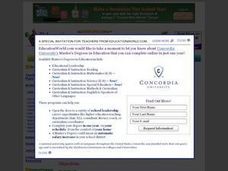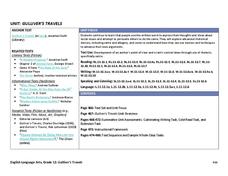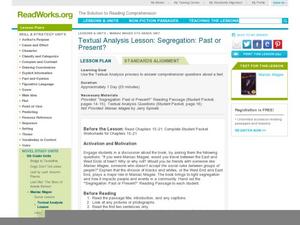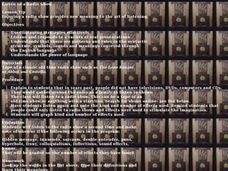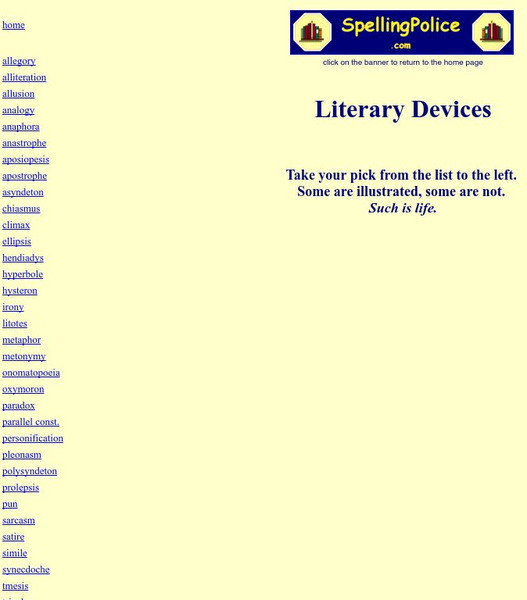Curated OER
Poetry Shopping Spree
Scholars demonstrate the ability to evaluate authors' use of literary elements such as metaphor, simile, personification, imagery, and onomatopoeia. They are provided with a checklist and must shop for poems that contain the poetry terms...
Penguin Books
A Teacher's Guide to the Signet Classic Edition of William Shakespeare's Twelfth Night
With the help of this teacher's guide, it won't take 12 nights for scholars to complete their study of William Shakespeare's romantic comedy about twins Viola and Sebastian. Pompous prigs, he shes, fatuous fools, and lovelorn lovers...
Simon & Schuster
Curriculum Guide to: Adventures of Huckleberry Finn by Mark Twain
Five lessons make up a curriculum guide to The Adventures of Huckleberry Finn. Readers find examples of Twain's use of irony, closely examine Huck's colloquial language, as well as his sense of morality, and identify themes in the novel....
EngageNY
Grade 11 ELA Module 2: Unit 2, Lesson 2
How did Elizabeth Cady Stanton advocate for women's rights? Pupils consider this question as they continue reading "An Address by Elizabeth Cady Stanton." They complete a Quick Write, analyzing how satire and sarcasm advance the author's...
Reed Novel Studies
Theodore Boone - Kid Lawyer: Novel Study
A child lawyer is exactly what people need ... not! With the novel study for John Grisham's Theodore Boone: Kid Lawyer, pupils use their imaginations to create their own examples of sarcasm. They also research a chosen famous lawyer and...
Louisiana Department of Education
Gulliver’s Travels
Gulliver's Travels tells the story of a man who goes on voyages and encounters strange people. A unit plan introduces readers to the classic text, as well as excerpts from other examples of sarcasm and satire, such as "A Modest Proposal"...
Chandler Unified School District
Satire: The Art of Indirect Persuasion
A free press is entitled to its opinions. While the news pages report the facts of events, editorial pages feature writers' and cartoonists' opinions about events to either directly or indirectly persuade. Introduce viewers to the art of...
Brooklyn College
Irony, Sarcasm, Satire
Irony, the discrepancy between what is expected and what occurs, is the focus of a reference sheet that provides young writers with models of this literary device.
Curated OER
Satire and The Adventures of Huckleberry Finn
Does Mark Twain’s satire become sarcasm and does he cross the line of propriety in The Adventures of Huckleberry Finn? As an introduction of satire, class members view an excerpt from The Daily Show and discuss Stewart's use of this...
Curated OER
Satire
The bite of comedy often rests on use of the literary devices detailed in this presentation. The definitions for terms like sarcasm, zeugma, and invective are followed by examples drawn from literature. Consider extending the lesson by...
Curated OER
Textual Analysis Lesson: Segregation: Past or Present?
Are your scholars reading Jerry Spinelli's Maniac Magee? If so, use this textual analysis packet and lesson guide to drive deeper thinking about the characters, create personal connections, and apply historical contexts to the text....
Curated OER
Cartoons for the Classroom: Sarcasm, Irony, and Satire
Satire, sarcasm, or irony? Editorial cartoons have long been the tool artists use to express their opinions about politics and politicians. Kevin "Kai" Kallaugher's four-panel cartoon offers readers an opportunity to examine how he uses...
Curated OER
Cartoons for the Classroom: What's Next in 2011?
Examine the toolbox of political cartoons with this analysis handout, which features a cartoon utilizing satire, sarcasm, and irony as it predicts the current events of 2011. Interestingly, this will also serve to get scholars looking...
Curated OER
What is Figurative Language?
Need a review of literary terms and figurative language? Although text heavy, these slides clearly define frequently used terms and provide color-coded examples.
Curated OER
Figures of Speech Quotes and Examples
Providing several examples of figures of speech, such as irony, paradox, and personification, this presentation could complement your lecture on pragmatic humor or humor in writing. Examples from Lewis Carroll's Alice's Adventures in...
Curated OER
Sarcasm
Learners often regard sarcasm as a "you know it when you see it" language phenomenon, leading to confusing tone and humor in student writing. This presentation not only defines sarcasm (and irony) in plain terms, it also provides many...
Curated OER
Literature: Satire in the American Dream
Eleventh graders examine cartoons for examples of satire, irony, and sarcasm. They write essays about cartoons, art work, or literature analyzing it for satirical elements. Finally, they create their own piece in one of the three areas...
Curated OER
Listen to a Radio Show
Students practice the art of listening. In this listening skills lesson, students listen to an old-time radio show and identify hidden messages, innuendo, sarcasm, double entendres, puns, hyperbole, irony, colloquialisms, inflections,...
Texas Education Agency
Texas Gateway: Irony, Sarcasm, and Paradox (English Ii Reading)
[Accessible by TX Educators. Free Registration/Login Required] In this lesson, you will learn to evaluate the role of irony, paradox, and sarcasm in literary nonfiction such as speeches and essays. It includes the definitions and...
TED Talks
Ted: Ted Ed: What Is Verbal Irony?
In the final of a three part series on irony, Christopher Warner gets into the irony you may use most often and most casually: verbal irony. [3:29]
Other
Spelling police.com: Literary Devices
A simple list of literary terms. Click on each for a definition and examples.
Virtual Salt
Virtual Salt: A Glossary of Literary Terms
This site provides a long list of literary terms complete with full definitions and examples.
Quizlet
Quizlet: Literary Elements/humorous Fiction Terms Test
Literary terms are included in this assessment. This test assesses the following words: allusion, antagonist, dialogue, flashback, imagery, protagonist, symbol, dialect, hyperbole, idiom, irony, parody, pun, sarcasm, understatment, and...
Quizlet
Quizlet: Literary Elements/humorous Fiction Terms Flashcards
Literary elements are included in this review exercise. Flashcards are provided for the following words: allusion, antagonist, dialogue, flashback, imagery, protagonist, symbol, dialect, hyperbole, idiom, irony, parody, pun, sarcasm,...


